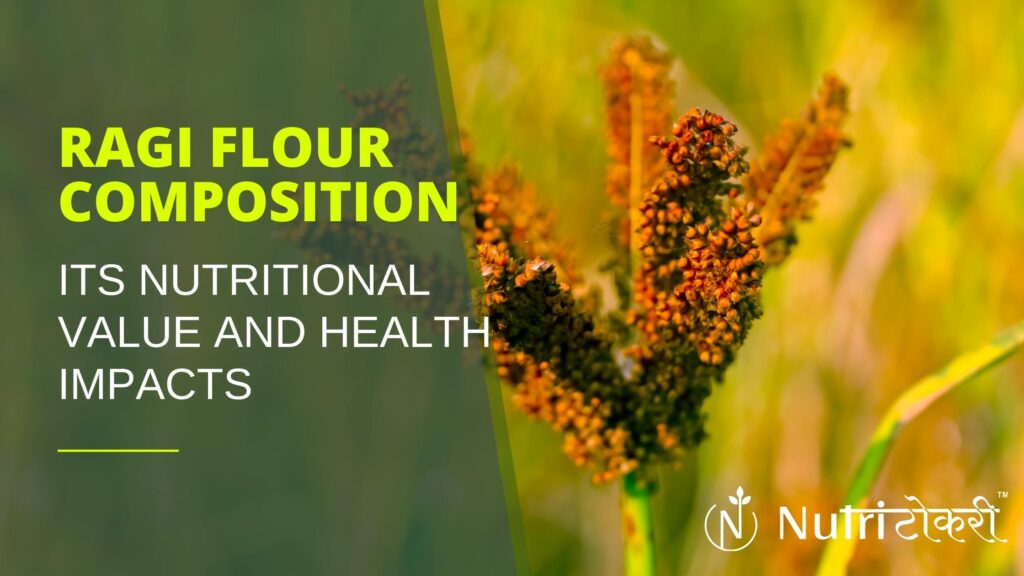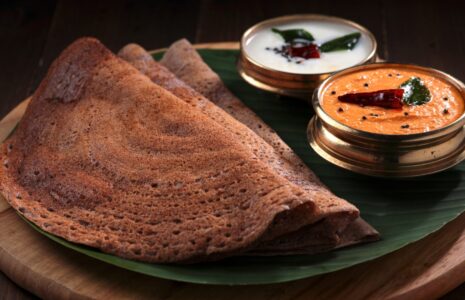No products in the cart.: ₹0.00
NutriTokri's Ragi Flour Composition: Its Nutritional Value and Health Impacts

Introduction
Ragi, also known as finger millet, is a versatile grain that has gained popularity due to its nutritional richness and health benefits. NutriTokri’s Ragi Flour offers a convenient and wholesome way to incorporate this superfood into your diet. In this blog post, we will explore the composition, nutritional value, and health impacts of NutriTokri’s Ragi Flour, shedding light on why it is a fantastic addition to a healthy lifestyle.
Understanding Ragi Flour
Ragi flour, derived from finger millet, is a nutritious and gluten-free alternative to traditional flours. Packed with essential nutrients like carbohydrates, dietary fiber, protein, calcium, iron, and vitamins, Ragi flour offers numerous health benefits. It aids in weight management, regulates blood sugar levels, promotes digestive health, strengthens bones, and supports heart health. Ragi flour’s high nutrient density and low glycemic index make it an ideal choice for individuals seeking a wholesome and nutritious diet. Incorporating NutriTokri’s Ragi Flour into your meals allows you to enjoy its natural goodness and contribute to a healthier lifestyle.
Nutritional Composition of Ragi Flour
NutriTokri’s Ragi Flour is carefully milled from premium-quality finger millet grains, preserving its natural goodness. Here’s a breakdown of the key nutrients found in Ragi Flour:
- Carbohydrates: Ragi Flour is a rich source of complex carbohydrates, providing sustained energy and helping to keep you fuller for longer.
- Dietary Fiber: Ragi Flour is packed with dietary fiber, aiding in digestion, promoting a healthy gut, and preventing constipation.
- Protein: Ragi Flour is an excellent plant-based protein source, making it ideal for vegetarians and vegans seeking to meet their protein requirements.
- Calcium: Ragi Flour is known for its high calcium content, which supports healthy bones, teeth, and overall bone health.
- Iron: Ragi Flour is a great source of iron, vital for maintaining healthy blood cells and preventing iron deficiency anemia.
- Vitamins and Minerals: Ragi Flour contains essential vitamins and minerals such as vitamin B complex, magnesium, phosphorus, and potassium, contributing to overall well-being.
Health Benefits of Ragi Flour

Incorporating NutriTokri’s Ragi Flour into your diet can have several positive impacts on your health:
- Weight Management: The high fiber content in Ragi Flour aids in weight management by promoting satiety and reducing hunger cravings.
- Diabetes Management: Ragi Flour has a low glycemic index, which helps regulate blood sugar levels, making it suitable for individuals with diabetes.
- Digestive Health: The fiber-rich nature of Ragi Flour promotes a healthy digestive system, prevents constipation, and supports gut health.
- Bone Health: Ragi Flour’s calcium and iron content contributes to maintaining strong bones, preventing osteoporosis, and supporting overall bone health.
- Heart Health: Ragi Flour is known to possess cholesterol-lowering properties, reducing the risk of cardiovascular diseases.
- Nutrient Density: Ragi Flour is a nutrient-dense alternative to refined flours, providing a wide array of essential vitamins and minerals in every serving.
Ragi Flour as a Gluten-Free Alternative

Ragi flour, derived from finger millet, serves as an excellent gluten-free alternative for those with gluten sensitivities or celiac disease. With its naturally gluten-free composition, Ragi flour offers a versatile option for baking and cooking. It can be used to create a variety of gluten-free recipes, including bread, pancakes, cookies, and more. Ragi flour’s nutty flavor and dense texture make it a satisfying substitute, while its nutritional value remains intact. By incorporating NutriTokri’s Ragi Flour into your gluten-free diet, you can enjoy the benefits of this wholesome grain without compromising on taste or dietary restrictions.
Ragi Flour for Bone Health
Ragi flour, also known as finger millet flour, is a fantastic choice for promoting and maintaining strong bone health. It is rich in essential nutrients that contribute to bone strength and density. Here’s how NutriTokri’s Ragi Flour supports bone health:
1. Calcium: Ragi flour is a great plant-based source of calcium. Adequate calcium intake is crucial for building and maintaining strong bones and teeth.
2. Iron: Ragi flour is high in iron, which plays a vital role in the production of collagen and other components necessary for healthy bone structure.
3. Vitamin D: Ragi flour contains vitamin D, which is essential for the absorption of calcium and phosphorus, both vital for bone health.
4. Magnesium: Ragi flour is a good source of magnesium, a mineral that aids in the proper utilization of calcium by the body.
5. Phosphorus: Ragi flour provides phosphorus, another essential mineral for bone formation and maintenance.
Incorporating NutriTokri’s Ragi Flour into your diet can help support bone health, prevent osteoporosis, and contribute to overall skeletal strength. Make Ragi Flour a part of your healthy eating plan to give your bones the nourishment they need.
Incorporating Ragi Flour into Your Diet

Incorporating Ragi flour, also known as finger millet flour, into your diet is a great way to boost nutrition and enjoy its numerous health benefits. Here are some ideas on how to incorporate NutriTokri’s Ragi Flour into your meals:
1. Baked Goods: Use Ragi flour as a substitute for all-purpose flour in baking recipes. It adds a nutty flavor and a denser texture to bread, muffins, cookies, and pancakes.
2. Porridge or Pudding: Cook Ragi flour with milk or water to create a nourishing and filling porridge. Sweeten it with your choice of fruits, nuts, or honey for added flavor.
3. Roti or Flatbread: Mix Ragi flour with whole wheat flour or other gluten-free flours to make nutritious rotis or flatbreads. Serve them with your favorite curries or dips.
4. Dosas or Pancakes: Prepare crispy dosas or fluffy pancakes using a batter made from Ragi flour. Pair them with chutneys or savory fillings for a delicious and wholesome meal.
5. Smoothies or Shakes: Add a spoonful of Ragi flour to your favorite smoothies or shakes for an extra dose of nutrition. It blends well with fruits, yogurt, and other ingredients.
6. Soups or Stews: Use Ragi flour as a thickening agent in soups or stews. It adds a nutritional boost and creates a hearty texture.
Remember to experiment with Ragi flour in your favorite recipes to discover new flavors and textures. NutriTokri’s Ragi Flour provides a versatile and healthy ingredient that can be easily incorporated into your everyday meals, supporting your overall well-being and adding a nutritious twist to your diet.
Precautions and Allergies
While Ragi flour is generally safe and well-tolerated by most people, it is important to be aware of potential precautions and allergies. Here are some considerations to keep in mind:
1. Allergic Reactions: Although rare, some individuals may have an allergic reaction to Ragi flour. If you have a known allergy to millet or gluten, it is advisable to avoid Ragi flour or consult with a healthcare professional before incorporating it into your diet.
2. Gluten Sensitivity or Celiac Disease: Ragi flour is naturally gluten-free, making it a suitable choice for individuals with gluten sensitivity or celiac disease. However, cross-contamination during processing or storage can occur. If you have severe gluten intolerance, ensure that the Ragi flour you choose is certified gluten-free and processed in a dedicated gluten-free facility.
3. Oxalate Content: Ragi flour contains oxalates, naturally occurring compounds found in many plant-based foods. Individuals with a history of kidney stones or other oxalate-related health conditions should consume Ragi flour in moderation and consult with a healthcare professional for personalized guidance.
4. Soaking and Fermenting: To enhance digestibility and nutrient availability, it is recommended to soak or ferment Ragi flour before use. Soaking can help reduce antinutrients and make it easier for the body to absorb nutrients.
5. Moderation and Balanced Diet: While Ragi flour offers various health benefits, it is essential to consume it as part of a balanced diet. Avoid excessive reliance on any single food item and ensure that you incorporate a variety of nutrient-rich foods in your meals.
If you have any underlying health conditions or concerns, it is always advisable to consult with a healthcare professional or a registered dietitian before making significant dietary changes or incorporating new ingredients like Ragi flour into your routine. They can provide personalized guidance based on your individual needs and help you make informed decisions.
Conclusion
NutriTokri’s Ragi Flour is a powerhouse of nutrients, offering a myriad of health benefits. By incorporating this versatile and nutrient-rich flour into your diet, you can enjoy sustained energy, improved digestion, better bone health, and overall well-being. Discover the goodness of Ragi Flour with NutriTokri and take a step towards a healthier lifestyle.
Note: Before making any significant dietary changes, it is advisable to consult with a healthcare professional or a registered dietitian to ensure it aligns with your specific nutritional needs and health conditions.





